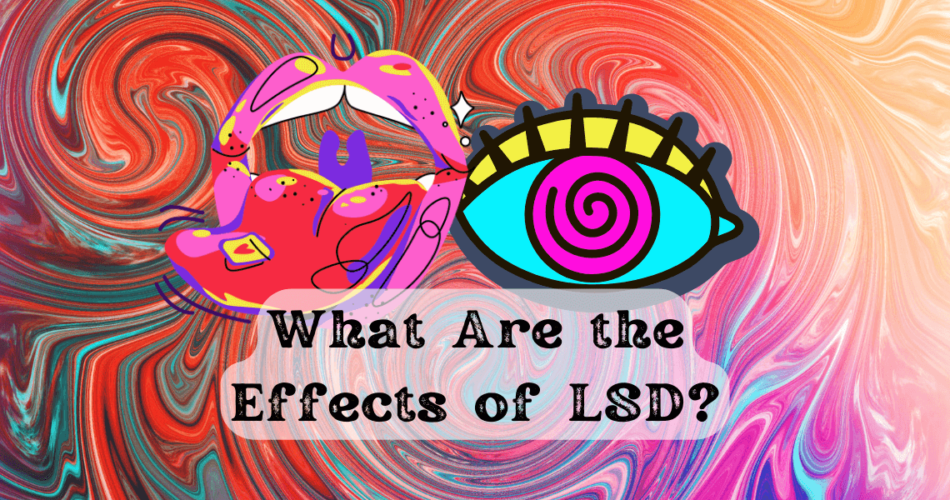LSD, also known as lysergic acid diethylamide, is a hallucinogenic drug that has been used in therapeutic and recreational settings for decades. What are the effects of LSD? In this article, we’ll take a look at the short-term and long-term effects of this powerful drug, as well as its potential risks.
TL;DR
- Short-term effects of LSD include euphoric feelings, altered perception of reality, visual hallucinations, and temporary changes in personality. On the physical side, the heart rate and blood pressure is increased, and users may experience dry mouth and nausea among other symptoms 🧠
- Long-term effects of LSD include flashbacks, an increased risk of anxiety attacks, and susceptibility to substance abuse. In severe cases, people who use LSD frequently may develop Hallucinogen Persisting Perception Disorder, characterized by visual disturbances even when you’re sober 👁️
Short-Term Effects of LSD
LSD acts on serotonin receptor sites in the brain and central nervous system, which can cause a wide range of effects, including hallucinations. Serotonin is a neurotransmitter involved in regulating mood, appetite, sleep, aggression and sensory perception. When LSD binds to receptor sites, it affects serotonin receptor activity that results in changes in behavior or thought patterns.
LSD use can cause a range of short-term effects that typically last between 8 and 12 hours. What are the effects of LSD? The most common include distorted perceptions, sensations, emotions, and visuals. Users may experience an altered sense of time or space, as well as intense emotional reactions such as joy or terror.
Physical effects of LSD use can include:
- nausea;
- dry mouth;
- dilated pupils;
- increased blood pressure and heart rate;
- tremors;
- loss of appetite;
- insomnia.
LSD use has been linked to temporary changes in personality and mood, as well as potential disturbances of thought processes. Note that the effects of LSD are unpredictable and may vary depending on a person’s environment or mental state at the time. It’s also important to be aware of potential dangerous unintended consequences associated with use of the drug.
Editor’s Note 🪶
Some people experience headaches and exhaustion for up to 72 hours after taking LSD. For this reason, it’s especially not recommended to take it if you have to be active the next day. And remember that it’s impossible to predict how you’ll feel and behave under the influence of hallucinogens.
What Are the Effects of LSD in the Long-Term?
Bad trips, good trips, flashbacks, and psychological addiction can also occur as a result of LSD use. A bad trip is an uncomfortable, often frightening experience that may include:
- feelings of anxiety;
- paranoia;
- fear;
- panic attacks;
- depression;
- terrifying thoughts;
- detachment from reality.

These feelings can shake a person’s mind for longer than just the duration of the trip after taking LSD. Long-term use of LSD is also associated with an increased risk of developing mental health disorders. In the most extreme cases, people may experience psychosis or a condition called Hallucinogen Persisting Perception Disorder (HPPD), in which they experience ongoing perceptual changes after using LSD. This can include visual distortions such as halos around objects, increased sensitivity to light, and trails of images that linger longer than normal.
Additionally, long-term use of LSD may increase the risk of developing substance abuse issues and other addiction problems. On the other hand, long-lasting positive mental effects were reported by people who used this recreational drug once.
What Are Flashbacks?
What are the effects of LSD in the long-term? One of the most significant is its potential to cause flashbacks. Flashbacks can occur days, weeks, or even years after taking a dose of LSD and create an intense recurring experience that often mimics the original LSD trip. While the frequency and intensity of these flashbacks vary from person to person, they’re often associated with significant psychological distress.
Potential Therapeutic LSD Use

Some research has suggested that there may be potential therapeutic benefits to using hallucinogens. For instance, some studies have suggested that LSD could potentially help with the treatment of depression, anxiety, and addiction issues. However, more information is needed to understand the medical use of LSD. Now you know the answer to “What are the effects of LSD?”.
Summary: Physical and Mental Effects of LSD
| PHYSICAL 🧍 | MENTAL 🧠 |
| Loss of appetite and nausea | Heightened mood |
| Dry mouth | Increased optimism |
| Dilated pupils | Intense emotions, which can range from joy to panic |
| Increased blood pressure and heart rate | Visual hallucinations (colors and shapes) |
| Tremors | Altered sense of time and space |
| Insomnia | Insights into the self |
Similar Posts:
- How to Tell If Someone Is On LSD? Signs of LSD Abuse and LSD Addiction
- Does LSD Kill Brain Cells or Fry Your Brain? Long-Term Effects of LSD
- LSD Addiction Treatment Programs and Signs of LSD Abuse
- LSD Toxicity: Is Lysergic Acid Diethylamide Toxic?
- Long Term Effects of Shrooms (Psilocybin)? Magic Mushrooms
- LSD Powder – About Lysergic Acid Diethylamide Sold as a White Powder
- How Safe Is LSD? An Overview




